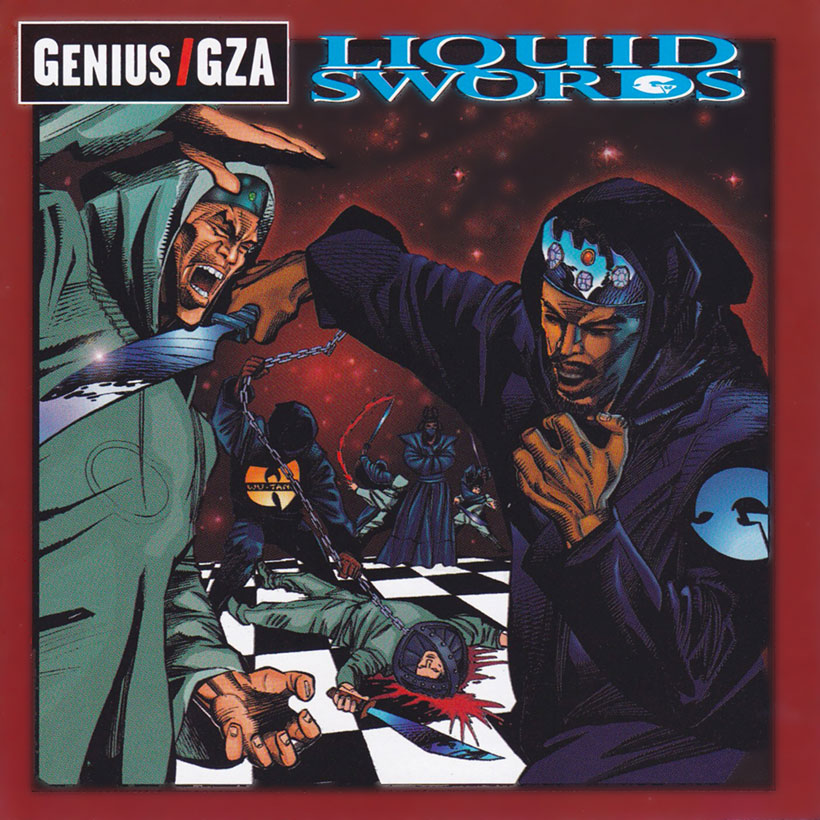Wu-Tang Clan’s coordinated attack on hip-hop in the 90s was nothing short of magisterial. Their 1993 debut album, Enter The Wu-Tang (36 Chambers), introduced each highly individual member of the group while laying the groundwork for a flurry of solo releases, all helmed by producer/mastermind RZA. The overall effect was to have the Wu appear like something of a superhero posse, each individual bringing a unique power. RZA had the production nous, creating a unique atmosphere by tweaking soul samples and lifting dialogue from martial arts films. Ol’ Dirty Bastard was the loose cannon: you never quite knew what was going to happen when he grabbed this mic. And GZA – well, there’s a reason he was also known as The Genius. And that reason is Liquid Swords.
Listen to Liquid Swords on Apple Music and Spotify.
Released on November 7, 1995, the fourth Wu-Tang solo album (and third affiliated release in that year alone), Liquid Swords is an out-and-out masterpiece – and the most cinematic album in the collective’s history, thanks in part to RZA’s clinical production. He digs up film dialogues that are creepier than on any other Wu record before or since; warps soul samples to rid any traces of retro kitsch (the disembodied vocal hook on “Cold World” still haunts); runs synth lines that add extra menace, not least with their staccato stabs on the opening title track. The results are a sinister, almost glacial soundbed for GZA to lay his vocals on.
And GZA brought his A-game, his considered, narrative flow coursing through the record – “flowing like liquid metal”, as he later put it; sharp like the swords in the film the album borrowed its name from, Legend Of The Liquid Sword, in which “people would get their head cut off but it would still be on their shoulders… because the sword was so sharp.” On group efforts, Wu-Tang members had to battle for the prime spots, competing like martial arts combatants to prove they were worthy enough to carry a track. But though every Wu affiliate of the time makes a guest turn on Liquid Swords, it’s clearly GZA’s show, his ghetto lyrics peppered with both martial arts and chess motifs – memorably reflected in the artwork – as he takes his position as the grandmaster of the group. And he’s understated with it, too. “Shadowboxin’” might give the opening and closing verses to Method Man, but GZA bobs and weaves in the middle, scoring all the fatal hits.
In a way, Liquid Swords ruined it for everyone else. It made the US Top 10 and also gave the Wu their first showing on the UK album charts since Enter The Wu-Tang. And while the Wu, both collectively and individually, would have plenty to offer in the coming years – not least Ghostface Killah’s Ironman, released the following year – the subsequent slowdown in Wu-Tang releases perhaps indirectly said something about how daunting a task it was to follow Liquid Swords. As a solo artist, GZA himself would go silent for four years, returning with 1999’s Beneath The Surface, a more than worthy effort at a time when the hip-hop landscape had changed again, its focus turning to the south as OutKast, Timbaland, and The Neptunes ushered in a new era.
But Liquid Swords remains timeless, its stature reflected in the fact that GZA has performed it live in its entirety since – an honor more often reserved for classic rock and prog albums. But then Liquid Swords pushes against boundaries, not only continually reaching the upper echelons of “hip-hop’s greatest albums” lists, but comfortably appearing in run-downs of the all-time greats, regardless of genre.




